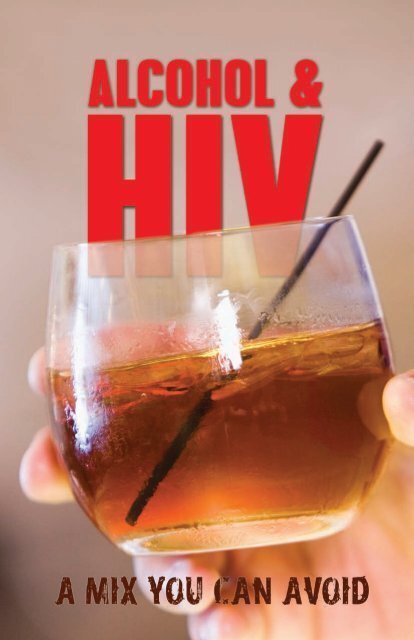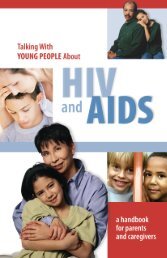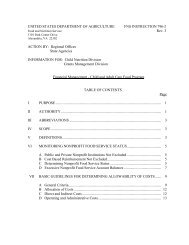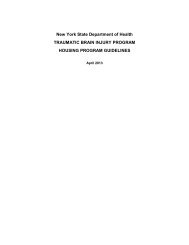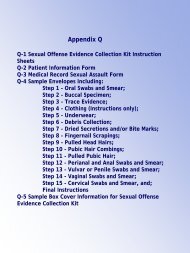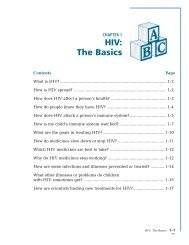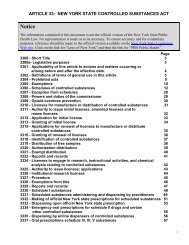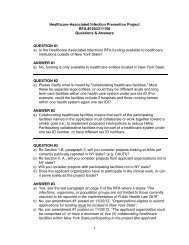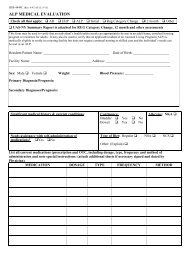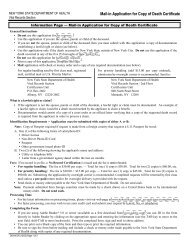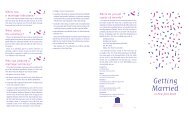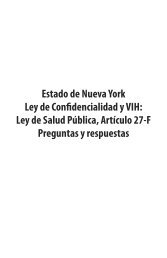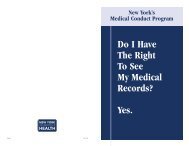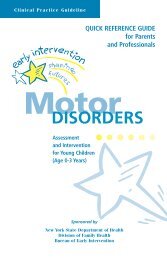Alcohol and HIV: A Mix you can avoid - New York State Department ...
Alcohol and HIV: A Mix you can avoid - New York State Department ...
Alcohol and HIV: A Mix you can avoid - New York State Department ...
Create successful ePaper yourself
Turn your PDF publications into a flip-book with our unique Google optimized e-Paper software.
When <strong>you</strong> are <strong>HIV</strong>positive, <strong>you</strong> have to work hard to stay healthy. Drinking less<br />
alcohol — or not drinking at all — <strong>can</strong> help <strong>you</strong> fight <strong>HIV</strong> disease <strong>and</strong> improve<br />
<strong>you</strong>r health. Quitting drinking or cutting down on drinking is just one part of<br />
leading a healthy lifestyle.<br />
This brochure explains how alcohol:<br />
• Can make <strong>you</strong> forget to take <strong>you</strong>r <strong>HIV</strong> medicines on time or not<br />
care about taking them at all.<br />
• Hurts <strong>you</strong>r liver, especially if <strong>you</strong> also have hepatitis C.<br />
• Can weaken <strong>you</strong>r immune system so that it does not fight <strong>HIV</strong> as well.<br />
• Affects <strong>you</strong>r judgment so <strong>you</strong> may not practice safe sex.<br />
• Increases the risk of side effects from <strong>HIV</strong> medicines <strong>and</strong> other<br />
medicines.<br />
• Changes how some prescription drugs work in <strong>you</strong>r body <strong>and</strong> <strong>can</strong><br />
make them less effective.<br />
For many people, drinking is a response to life’s problems <strong>and</strong> pressures. If <strong>you</strong><br />
drink too much alcohol to deal with depression or the stress of living with <strong>HIV</strong>,<br />
talk with <strong>you</strong>r doctor or healthcare provider.
How much alcohol is too much?<br />
There is no recommended “safe” level of alcohol use for people with <strong>HIV</strong>.<br />
Even drinking a lot onagain <strong>and</strong> offagain <strong>can</strong> make <strong>you</strong>r <strong>HIV</strong> treatment<br />
more difficult. Here are some warning signs of drinking too much:<br />
• You have trouble with personal relationships, miss work or medical<br />
appointments, or <strong>you</strong> verbally or physically abuse others.<br />
• You have physical “withdrawal” effects — such as sweats or shaking<br />
— or health problems like pancreatitis or liver disease.<br />
• You are not able to stop drinking once <strong>you</strong> start.<br />
• You need alcohol to have sex.<br />
• “Binge” drinking — <strong>you</strong> may not drink every day, but then <strong>you</strong> have<br />
45 or more drinks at a time.<br />
Talk openly with <strong>you</strong>r doctor or a counselor about how much <strong>you</strong> drink.<br />
If <strong>you</strong> need help to confront a drinking problem, see page 8 for services<br />
that <strong>can</strong> help.<br />
2
How much alcohol is in a “st<strong>and</strong>ard” drink?<br />
If <strong>you</strong> know how much alcohol is in a “st<strong>and</strong>ard” drink, <strong>you</strong> <strong>can</strong> figure out how<br />
much alcohol <strong>you</strong> consume. Each of the drinks pictured below contains about<br />
the same amount of alcohol. But the amount of alcohol in some drinks <strong>can</strong> vary.<br />
For example, some mixed drinks have more than one “shot” of liquor. Keeping<br />
track of how much alcohol <strong>you</strong> take in <strong>can</strong> help <strong>you</strong> cut down.<br />
BEER OR WINE<br />
COOLER<br />
12 ounces<br />
5% alcohol<br />
MALT LIQUOR<br />
8.5 ounces<br />
7% alcohol<br />
TABLE WINE 80PROOF<br />
5 ounces LIQUOR<br />
12% alcohol 1.5 ounces<br />
40% alcohol<br />
(gin, vodka, whiskey, etc.)<br />
<strong>Alcohol</strong>, <strong>HIV</strong>, <strong>and</strong> <strong>you</strong>r immune system<br />
<strong>HIV</strong> attacks the body’s immune system. The immune system protects the body<br />
from infections <strong>and</strong> disease, but it <strong>can</strong>’t totally protect the body from <strong>HIV</strong>.<br />
<strong>HIV</strong> medicines <strong>can</strong> decrease the amount of <strong>HIV</strong> in <strong>you</strong>r body <strong>and</strong> help restore<br />
<strong>you</strong>r immune system. <strong>Alcohol</strong> <strong>can</strong> weaken <strong>you</strong>r immune system so that it<br />
<strong>can</strong>not properly fight <strong>HIV</strong>.<br />
Physical side effects of alcohol:<br />
• Can weaken <strong>you</strong>r immune system so that it does not fight <strong>HIV</strong> as well.<br />
• Can increase the risk of side effects from medicines.<br />
• Liver <strong>and</strong> pancreas damage.<br />
• Trouble sleeping.<br />
• Stomach ulcers <strong>and</strong> problems with <strong>you</strong>r digestive system.<br />
3
<strong>Alcohol</strong>, <strong>HIV</strong>, <strong>and</strong> <strong>you</strong>r liver<br />
Your liver breaks down waste products from <strong>you</strong>r blood as part of <strong>you</strong>r body’s<br />
normal functioning. It also breaks down alcohol, medicines, <strong>and</strong> other toxins.<br />
<strong>Alcohol</strong> <strong>and</strong> <strong>HIV</strong> <strong>can</strong> affect <strong>you</strong>r liver in these ways:<br />
• <strong>Alcohol</strong> harms the liver.<br />
• <strong>Alcohol</strong> <strong>can</strong> interfere with <strong>you</strong>r treatment for <strong>HIV</strong> <strong>and</strong> for hepatitis B or<br />
hepatitis C (see next page).<br />
• <strong>HIV</strong> itself puts stress on the liver.<br />
To reduce liver side effects:<br />
• Drink less alcohol or stop drinking.<br />
• Get regular tests of <strong>you</strong>r liver function as part of <strong>you</strong>r <strong>HIV</strong> medical<br />
treatment — especially if <strong>you</strong> also have hepatitis. Tell <strong>you</strong>r doctor or<br />
healthcare worker if <strong>you</strong> drink.<br />
• Get tested for hepatitis. If <strong>you</strong> test positive, there are treatments that<br />
may help.<br />
If <strong>you</strong>r liver is damaged, <strong>avoid</strong>ing alcohol is the best thing <strong>you</strong> <strong>can</strong> do to keep it<br />
healthy.<br />
Drinking <strong>and</strong> staying with <strong>you</strong>r <strong>HIV</strong> medicine<br />
schedule<br />
The worst effect that drinking <strong>can</strong> have is to knock <strong>you</strong> off schedule for taking<br />
<strong>you</strong>r <strong>HIV</strong> medicines.<br />
Taking several different <strong>HIV</strong> medicines <strong>can</strong> be complicated. You need to take<br />
them on time, take the right dosage, <strong>and</strong> know whether or not to take them with<br />
food. Heavy drinking <strong>and</strong> binge drinking <strong>can</strong> make <strong>you</strong> forget to take <strong>you</strong>r <strong>HIV</strong><br />
medicines or skip doses. Or <strong>you</strong> may become too depressed or frustrated to care<br />
about taking them on schedule.<br />
4
<strong>HIV</strong>, hepatitis C, <strong>and</strong> <strong>you</strong>r liver<br />
About 1 out of every 4 persons with <strong>HIV</strong> is “coinfected” with hepatitis C, a virus<br />
that <strong>can</strong>not be cured. Most people with hepatitis C will develop a chronic, longterm<br />
form of the disease. If hepatitis C is not treated, it <strong>can</strong> lead to liver disease<br />
<strong>and</strong> <strong>can</strong>cer.<br />
Hepatitis C is a lot like <strong>HIV</strong> — <strong>you</strong> <strong>can</strong> fight it by taking medicines <strong>and</strong> by<br />
making smart choices to lead a healthy lifestyle. Heavy alcohol use <strong>can</strong> speed<br />
up the damage to <strong>you</strong>r liver caused by hepatitis C. The longer <strong>you</strong> have hepatitis<br />
C <strong>and</strong> continue to drink, the greater <strong>you</strong>r chances of developing liver problems.<br />
If <strong>you</strong> have <strong>HIV</strong> <strong>and</strong> hepatitis C:<br />
• Drink little or no alcohol. If <strong>you</strong> drink no alcohol, there is a better chance<br />
that hepatitis C medicines will work.<br />
• Avoid alcohol before <strong>you</strong> start taking hepatitis C medicines <strong>and</strong> during<br />
treatment. If <strong>you</strong> do, there is a much better chance the medicines will<br />
work.<br />
• If <strong>you</strong> <strong>can</strong>’t quit drinking or reduce <strong>you</strong>r drinking before taking hepatitis<br />
C medicines, talk with <strong>you</strong>r doctor or healthcare worker about<br />
counseling or an alcohol “rehab” program.<br />
• Stick with <strong>you</strong>r schedule for taking separate medicines for <strong>HIV</strong> <strong>and</strong><br />
hepatitis C.
<strong>Alcohol</strong>, sex, <strong>and</strong> the spread of <strong>HIV</strong><br />
If <strong>you</strong> have <strong>HIV</strong>, take extra steps to <strong>avoid</strong> spreading the virus to others.<br />
<strong>Alcohol</strong> <strong>can</strong> affect <strong>you</strong>r judgment when <strong>you</strong> have sex. You might forget to<br />
use a condom or not stick with a plan to protect <strong>you</strong>rself. Or, <strong>you</strong> may not realize<br />
the risk involved in a situation.<br />
Some people use alcohol <strong>and</strong> drugs to increase their sexual enjoyment. If <strong>you</strong><br />
engage in “highrisk” sex — anal sex or sex with multiple partners — <strong>and</strong><br />
drink at the same time, <strong>you</strong> might not protect <strong>you</strong>rself. Make sure <strong>you</strong>:<br />
• Use “barrier protection” — a male latex condom or a female<br />
polyurethane condom each time <strong>you</strong> have intercourse or a latex dental<br />
dam for oral sex. This <strong>can</strong> prevent the spread of <strong>HIV</strong> <strong>and</strong> protect <strong>you</strong> from<br />
“reinfection” with another type of <strong>HIV</strong> or another sexually transmitted<br />
disease (STD).<br />
• Talk with <strong>you</strong>r partner <strong>and</strong> agree on how to protect <strong>you</strong>rselves.<br />
6
Taking control of <strong>you</strong>r drinking<br />
If <strong>you</strong> decide <strong>you</strong> want to drink less or quit drinking, that’s an important first<br />
step. Talk with someone <strong>you</strong> trust <strong>and</strong> get support. Talk with <strong>you</strong>r doctor or<br />
healthcare worker because it relates to <strong>you</strong>r <strong>HIV</strong> treatment. He or she <strong>can</strong><br />
give <strong>you</strong> advice <strong>and</strong> recommend services to help <strong>you</strong>. Here are some things<br />
to consider:<br />
• Set shortterm goals: Reduce the number of drinks <strong>you</strong> have <strong>and</strong>/or how<br />
often <strong>you</strong> drink.<br />
• Get a referral to talk with an addictions counselor. He or she <strong>can</strong> discuss<br />
the reasons why <strong>you</strong> drink <strong>and</strong> arrange for medical treatment if <strong>you</strong><br />
need it.<br />
• Join a support group: Share <strong>you</strong>r thoughts <strong>and</strong> feelings with other people<br />
going through the same challenges.<br />
• Find a treatment program: Some <strong>HIV</strong> treatment programs also provide<br />
services for substance abuse.<br />
Don’t give up hope if <strong>you</strong> slip back into drinking (relapse). Relapse is common.<br />
Keep <strong>you</strong>r counseling appointments <strong>and</strong> keep talking with <strong>you</strong>r <strong>HIV</strong> care<br />
providers about <strong>you</strong>r longterm goals to be sober <strong>and</strong> fight <strong>HIV</strong>.<br />
7
Resources<br />
In <strong>New</strong> <strong>York</strong> <strong>State</strong> (outside of <strong>New</strong> <strong>York</strong> City)<br />
<strong>New</strong> <strong>York</strong> <strong>State</strong> Office of <strong>Alcohol</strong>ism <strong>and</strong> Substance Abuse Services (OASAS)<br />
Visit the website or call the number below to find alcohol treatment<br />
programs <strong>and</strong> services near <strong>you</strong>: 18005225353<br />
(Monday – Friday, 9 am – 5 pm)<br />
www.oasas.state.ny.us<br />
In <strong>New</strong> <strong>York</strong> City<br />
For crisis intervention <strong>and</strong> referral services, 24hrs/7days per week, call:<br />
1800LIFENET (5433638); En Español: 1877AYUDESE<br />
<strong>Alcohol</strong>ics Anonymous (AA) World Services<br />
475 Riverside Drive, 11th Floor, <strong>New</strong> <strong>York</strong>, NY 10115<br />
2128703400<br />
Makes referrals to local AA groups <strong>and</strong> provides information on the AA<br />
program. Many cities <strong>and</strong> towns also have a local AA office listed in the<br />
telephone book.<br />
<strong>HIV</strong>/AIDS Hotline (<strong>New</strong> <strong>York</strong> <strong>State</strong> <strong>Department</strong><br />
of Health)<br />
1800541AIDS (English)<br />
1800233SIDA (Spanish)<br />
Deaf <strong>and</strong> hard of hearing: 18006621220<br />
More <strong>HIV</strong>/AIDS publications<br />
The AIDS Institute has a wide range of publications on <strong>HIV</strong>/AIDS at:<br />
www.nyhealth.gov/diseases/aids/publications<br />
8
<strong>New</strong> <strong>York</strong> <strong>State</strong><br />
9609 <strong>Department</strong> of Health 8/09


